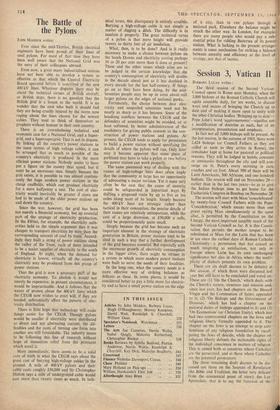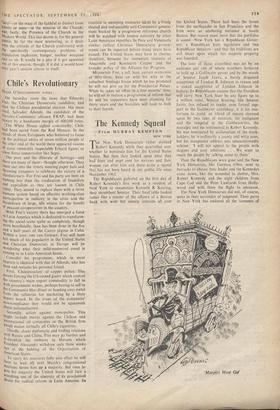Session 3, Vatican II
BARBARA LUCAS writes :
The third session of the Second Vatican Council opens in Rome next Monday, when the
3,000 bishops of the Roman Catholic Church will
again assemble daily, for ten weeks, to discuss ways and means of bringing the Church up to
date and of making it more open to unity with the other Christian bodies. 'Bringing up to date'— Pope John's word 'aggiornatrzento'—signifies not a modification of doctrine as such, but of it interpretation, presentation and emphasis.
In fact not all 3,000 bishops will be present. At the last session, in the autumn of 1963, there were
2,424 bishops (or Council Fathers as they are called as soon as they arrive in Rome), the remainder kept at home for pastoral or political .f reasons. They will be lodged in hotels, convents s
or seminaries throughout the city and will con- verge on St. Peter's every morning in cars coaches and on foot. About 500 of them will Ix
Latin Americans, 300 Africans, and one hundred Indians. The session will end on November 20—
earlier than in the last two years—so as to give the Indian bishops time to get home for the Eucharistic Congress in Bombay on November 28 The session will start with Mass 'concelebrated by twenty-four Council Fathers with the Pope 'Concelebration,' which means more than one priest saying Mass simultaneously at the same altar, is permitted by the Constitution on the Liturgy, the most important tangible result of the Second Vatican Council so far. It is this Consti- tution that permits the mother tongue to be substituted at Mass for the Latin that has been in use since the earliest days of Roman Catholic
Christianity—a permission that has caused at much misgiving as satisfaction, not only in Europe where Latin has its own unchanging significance but also in Africa where the multi- plicity of dialects presents its own problem.
There are six draft decrees to be debated at this session, of which three were discussed last year but still have to be concluded and voted on, 1 These are (1) 'On the Church,' which deals with I the Church's nature, structure and mission and. since last year, has had chapters on the Blessed I Virgin and the Communion of Saints appended to it; (2) 'On Bishops and the Government of Dioceses,' which has had a chapter on the
pastoral duties of bishops appended to it; and (3) 'On Ecumenism' (or Christian Unity), which has
had two controversial chapters on the Jews and religious liberty formally appended to it. The chapter on the Jews is an attempt to strip anti- Semitism of any religious foundation by excul-
pating the Jews of deicide, while the chapter on religious liberty defends the inalienable rights of
the individual conscience in matters of religion. This is aimed both at countries where Catholics are the persecuted, and at those where Catholics are the potential persecutors.
The three remaining draft decrees to be dis- cussed are those on the Sources of Revelation (the Bible and Tradition, the latter very delicate from the ecumenical point of view); the Lay Apostolatc, that is to say the function of the laity'—or the mass of the faithful as distinct from Priests or nuns—in the mission of the Church; and, lastly, the Presence of the Church in the Modern World. This last decree is, for the general Public, by far the most interesting, as it deals With the attitude of the Church confronted with the specifically contemporary problems of Population explosion, hunger, nuclear weapons and so on. It would be a pity if it got squeezed out of this session, though, if it did, it would have next year's session almost to itself.































 Previous page
Previous page